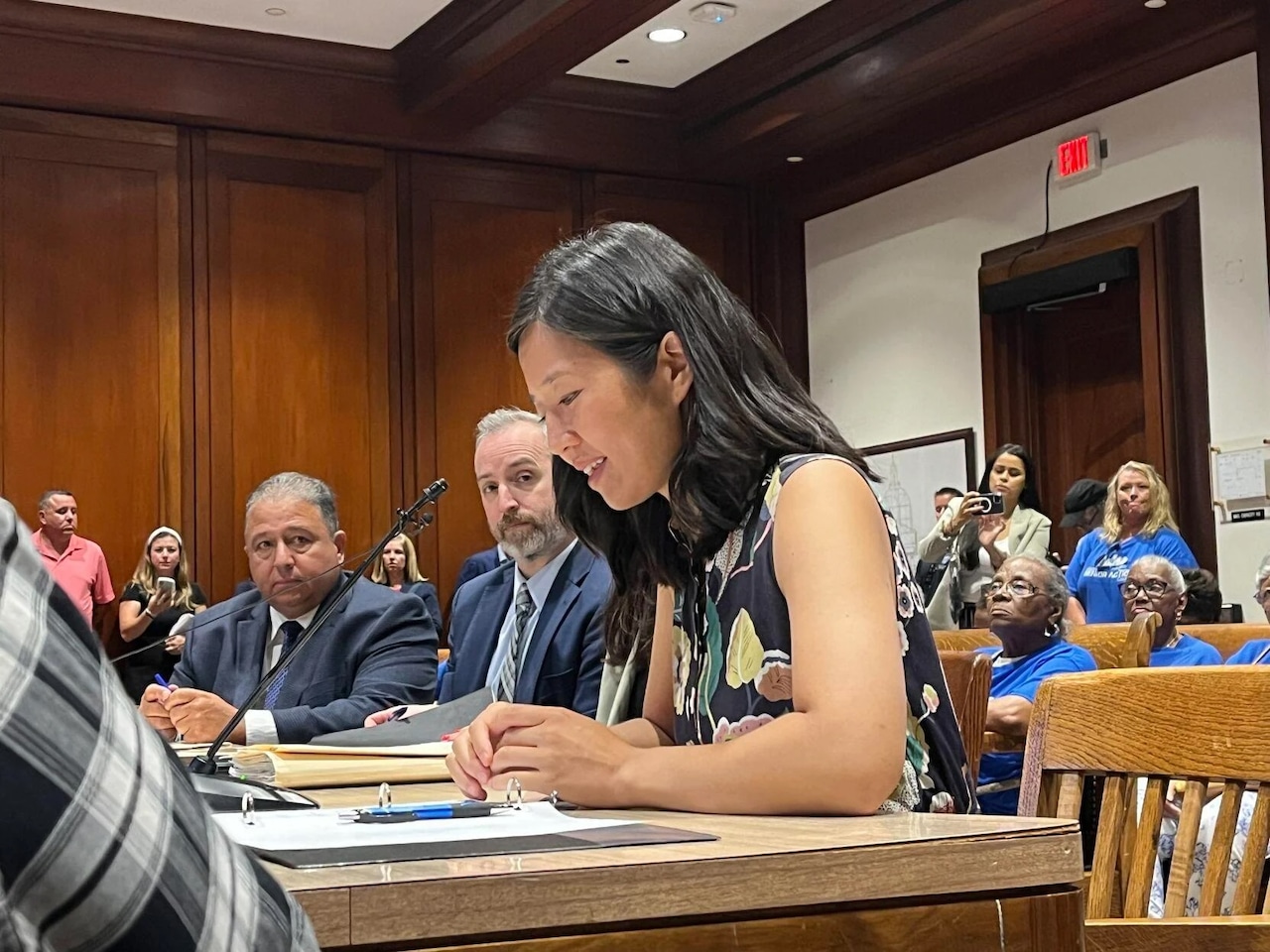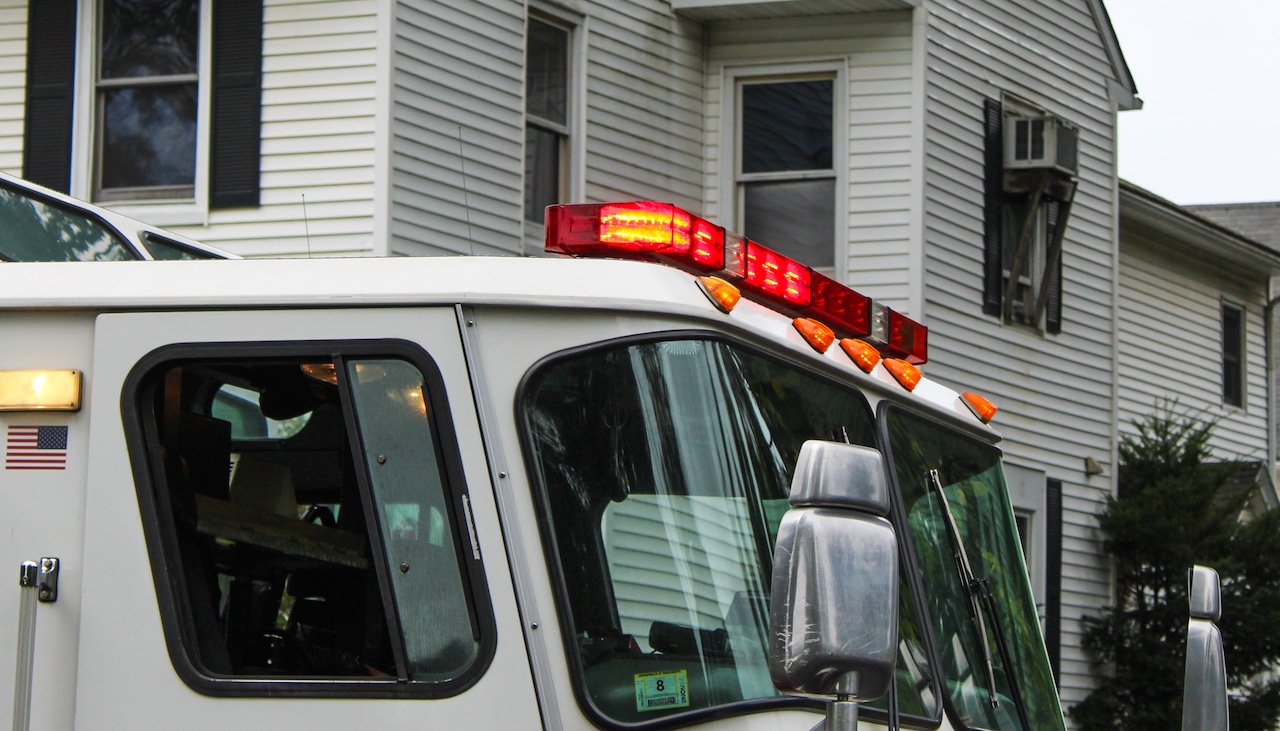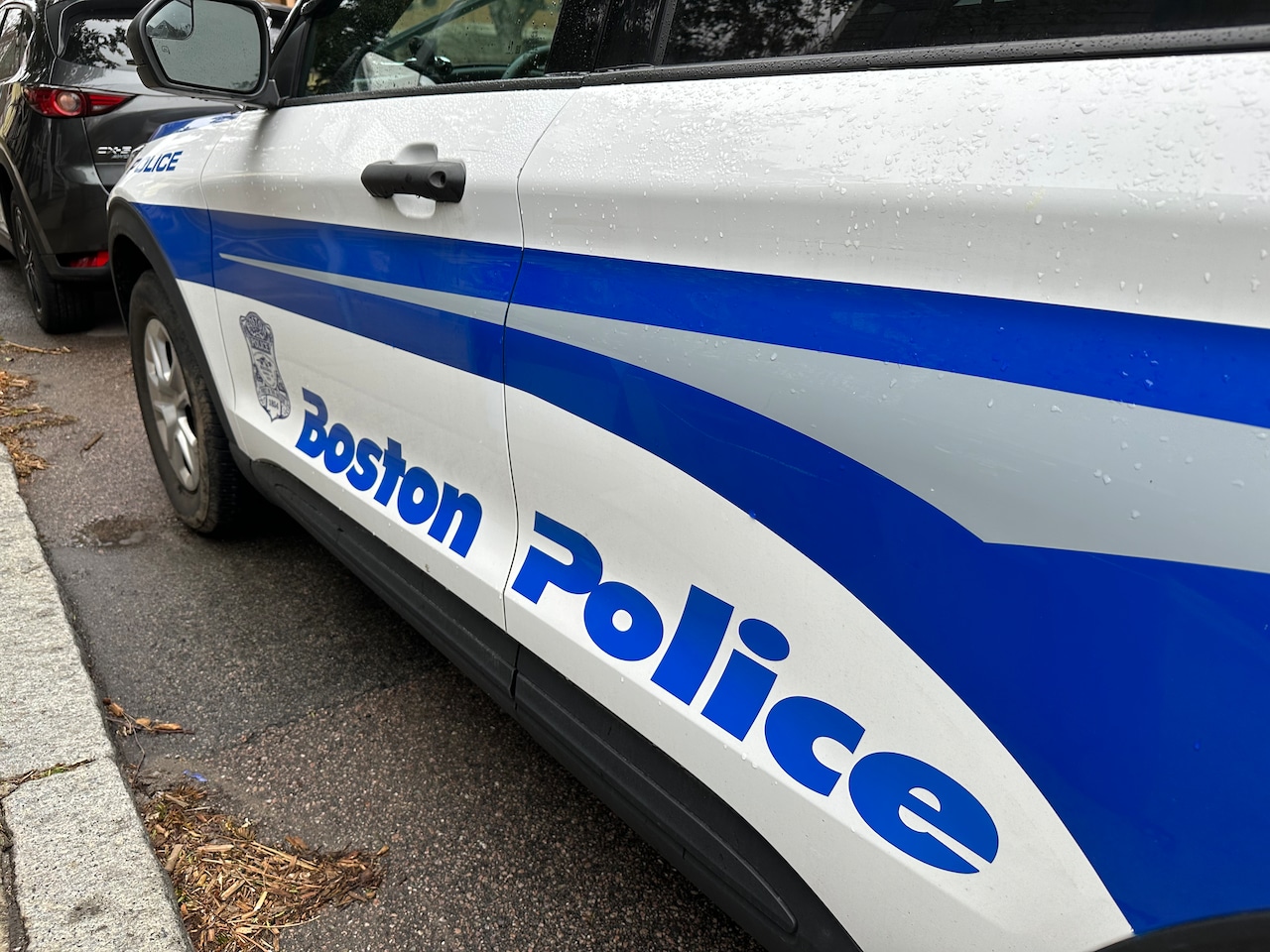
Boston Mayor Michelle Wu directly pitched lawmakers Tuesday on her plan to allow the city to avoid a potentially dramatic tax hike for residents by temporarily placing more of the burden on commercial property owners.
Legislators on the Joint Committee on Revenue pushed Wu on the idea, with questions about the effect of the policy on small businesses; whether it would negatively affect those in communities outside of Boston who go to the city to work, shop and eat; and comparisons between a similar policy employed 20 years ago and the current economic environment.
The mayor says her plan would protect residential property owners from larger increases in taxes due to declining commercial values.
Under the current scheme, 60% of Boston’s property tax revenue comes from commercial properties, and 40% from residential owners.
However, as the world has changed in the wake of the COVID-19 pandemic, fewer and fewer companies have returned to downtown offices.
Small businesses such as restaurants and retail have also suffered without a bustling workforce in downtown and other neighborhoods.
And commercial properties are expected to see a reduction in values in this year’s assessment.
The Wu administration wants to get approval for the tax change before it has to send tax bills out to residents.
And since there has been controversy around the idea, Wu likely wants to see it passed in formal sessions — which end July 31 — before any single lawmaker’s objection could block the plan from moving forward during informal sessions in the final five months of 2024.
It’s intended to provide a “softer landing” for homeowners by slowing the projected increases in taxes on residential properties over five years and taxing commercial property owners at a higher rate to make up the shortfall.
The mayor says if state officials don’t sign off on the plan that she and the Boston City Council both approved, city residents can see as much as a 33% jump in their taxes next year.
“That is the number that keeps me up at night,” Wu said.
Opponents of the measure — many of which are members of Boston’s business community — say the mayor’s office is mischaracterizing how large of an increase residents would face.
Boston keeps its first- and second-quarter tax bills flat, a 0% increase from the previous year, meaning the jump between the second and third quarters could reach up to 33% if Wu’s plan doesn’t get approval on Beacon Hill. These opponents say it’s more accurate to say it’s a 16% increase for residential taxpayers.
Rep. Mark Cusack, co-chair of the Revenue Committee where the bill is currently sitting, pressed Wu on this topic.
“I want to start with the 33% because it’s not really 33% because of the uniqueness of Boston’s quarterly taxes,” he said, in his first remarks to the mayor and her team during Tuesday’s hearing. “You’re looking at a 16.5% increase in property tax, but that’s not spread out over the four quarters.” He asked why the city didn’t spread out the increase.
Nicholas Ariniello of the Boston Assessing Department replied that this tax collection system is laid out in the city’s statute to prevent “over collecting”, and Wu added that it would still be a shock for residents to see a 33% increase from one quarter to the next, and that even a 16.5% increase is incredibly expensive.
“We cannot afford to become an even more prohibitively expensive place to live,” she said. “I don’t have to tell you all what a 33% increase in taxes could do to residents, many of them are here today and sharing their own stories. And I’ve heard from our residents and community members across every neighborhood in every part of our city that a 33% spike in residential taxes will be devastating.”
One point Wu made throughout her testimony is that the tax scheme is not intended to punish businesses, especially those struggling in the wake of the COVID-19 pandemic — and that commercial property owners would actually see a decrease in their taxes regardless of whether her plan prevails.
If the city does not shift the tax burden, commercial property owners will see a 13% decrease in their taxes. If they employ Wu’s plan, these property owners would still see a 6% or 7% decrease in their bill, she said.
“I want to emphasize that we’re not trying to increase the amount of taxes that businesses will pay. Overall, business taxes will still go down under the proposal that we’re putting before you. But we’re just making it so that it’s not going down by as much as it would have otherwise, because we want residents not to go up by as much as they would have otherwise as well,” she said.
The average single family tax bill in Boston in fiscal year 2024 is $5,522, according to Ariniello. That would increase to an average $6,432 next year without shifting the burden.
The majority of the people who testified in favor of Wu’s plans were Boston residents, including a number of senior citizens who said their fixed income can’t absorb a large tax hike.
Joanne Chambers, a longtime Roxbury homeowner and member of the Massachusetts Senior Action Council, said she survives on her Social Security checks.
“I can’t imagine it being 30%, 33, 16 — whatever it is, I don’t have it. And I know the other seniors, they don’t have it. We don’t have it,” she said.
Marty Walz, interim director of the Boston Municipal Research Bureau, said she doesn’t deny that it would be a large jump for residents, but that there are other options the city could explore before shifting higher taxes onto businesses.
She recommended that the city dip into its $1 billion-plus reserves, or rainy day fund, to cover the potential rise in property taxes.
“The city could use a modest portion of those reserves in the next year or two to set up a fund to provide relief to homeowners below a certain income level who need assistance in paying their property taxes. We recognize that for some homeowners a tax increase of 10% or more may be a substantial burden. Creating a fund like this would provide short-term relief to those homeowners, just as the home rule petition would do, but without the negative consequences on local businesses,” she said.
Cusack also pressed Wu on this question, asking “why did you choose this [plan] versus, for example, assessing your healthy rainy day fund to mitigate the impact on residents.”
The city’s chief financial officer, Ashley Groffenberger, replied that Boston needs that reserve fund to maintain its AAA bond rating.
In fact, she said, a recent Moody’s report said Boston needed to increase that rainy day pot to compete with other cities of similar sizes.
Another member of the committee indicated that she didn’t think it was a good idea to use the rainy day money.
Sen. Lydia Edwards, who represents parts of Boston including downtown, said she sees those funds as needing to be reserved for an emergency.
“I think of rainy day funds, I think of a pandemic. I think emergencies. I think extreme moments where the city of Boston needs to tap in and grab as much as possible for one time, not an annual thing. I think that the rainy day fund is for those extreme moments when there’s no alternative and time is moving fast,” Edwards said.
Walz replied that there was a “philosophical difference” in how to determine “whether or not it’s currently raining.”
“There are many who would argue, if they’re struggling businesses, it’s raining,” she said. “So what we’re suggesting is using a portion, not all of it. There’s a billion dollars sitting there.”
Walz also said the situation is an example of why Boston needs to diversify its revenue stream, which more than any other large American city relies on taxes from its commercial property base.
Edwards said she was “conflicted” about the bill.
“I do want to see downtown, we do need more foot traffic. We do need a vibrant commercial environment. At the same time, the backbone of the city, and the reason why we have community, are these people, middle class and working class people, the city workers,” she said.
Rep. David Linsky also said he was “trying to balance two things here” in his opinion of the bill. On the one hand, he said, he tries to defer to local communities for decisions like these.
The tax shift was approved by the Boston City Council and championed by the mayor’s office. However, he said he is worried the policy could affect his constituents who commute into the city.
“My constituents, although they certainly don’t directly pay property tax bills in the city of Boston, they do work there. They do patronize businesses there, they do shop there, they do go to the restaurants there. So indirectly, this could have an effect on my constituents as well, because a large percentage of my constituents work or go to the city of Boston, on pretty much a daily basis. So I’m trying to find a balance here,” Linsky, of Natick, said.
Rep. Francisco Paulino, of Methuen, repeatedly challenged the Boston mayor about how the change would affect small businesses.
“So if I spent billions of dollars, or millions of dollars, to have an office building… because I believe in Massachusetts, then I should be penalized? Be taxed at a higher rate? Because I believe in Massachusetts, because I am so committed?,” Paulino said to Wu.
Wu again emphasized that businesses would still be seeing a decrease in their taxes under her plan. She added that with the devaluation of office buildings, small businesses would also likely see rent decreases.
“When you think about the balance sheet of a small business in one of these buildings, it’s rents that they have to pay for the space that they’re in, salaries for their employees, supplies, which are going up a lot with the cost of everything and the supply chain, and taxes are then a piece of that as well,” she said, then arguing that local businesses would need to increase salaries for their employees if they want workers who can afford to live in the area as costs of living in Boston go up.
The Massachusetts Restaurant Association testified against the home rule petition.
“These rates will be passed on to the businesses leasing within the property, driving up operational costs that are already at record high levels,” Jessica Muradian of the MRA said. “Restaurants continue a long journey to recover from the pandemic… We do not want to add an increase in property taxes to the list of operational costs hurting restaurants in the city of Boston.”
Wu based her plan on a similar law former Boston Mayor Thomas Menino sought and received in 2004, as the city faced economic turmoil in the wake of the dot-com bubble bursting.
Rep. Rob Consalvo of Hyde Park, who filed the home rule petition on Wu’s behalf, said he had confidence in the plan because of his experience as a city councilor in Boston when Menino’s tax shift occurred.
“This is something that I voted on in 2004. This is something that we vetted very thoroughly as a council and I know the Legislature did at that time, too,” he said. “And so we know, and I can tell you firsthand as a former city councilor and a city resident, how important that this issue is to the city of Boston, and how important this issue is to the constituents of the taxpayers that we represent.”
The Greater Boston Real Estate Board said the economic climate in 2024 is different than it was in 2004.
“Boston took this path once before, in the early 2000s, when the city needed some flexibility to manage its recovery from the dot-com recession. But today’s challenge is wholly different. In 2004, the city faced a temporary downturn, which required a temporary solution. In 2024, Boston needs to adjust to the new and durable reality of lower office values due to hybrid and remote work,” wrote CEO Greg Vasil in a letter to the committee.
Wu argues that the tool has worked once before, and would work again this time.
Asked by reporters after her testimony if she felt, by the reaction of the committee members, if her petition has sufficient support in the Legislature, Wu was noncommittal.
“We are going to continue making our best case and there are many other people here to testify, who are also going to make their respective cases as well. And we will engage with any legislator who wants to learn more and help explain the impact that this would have on our residents,” she said.






